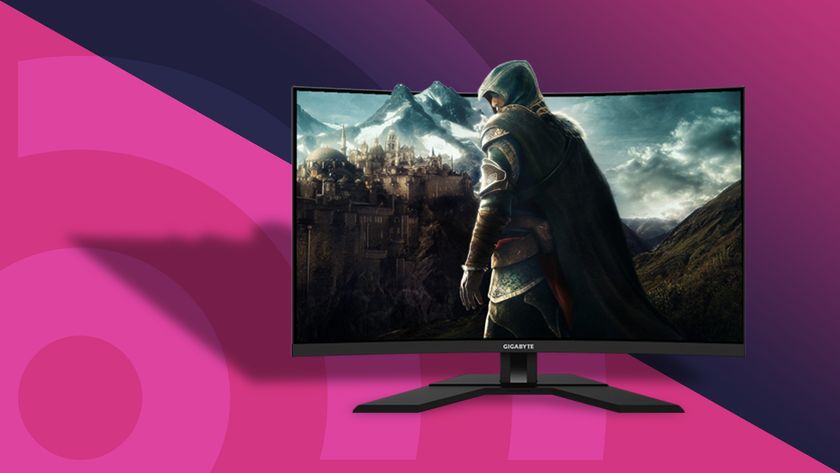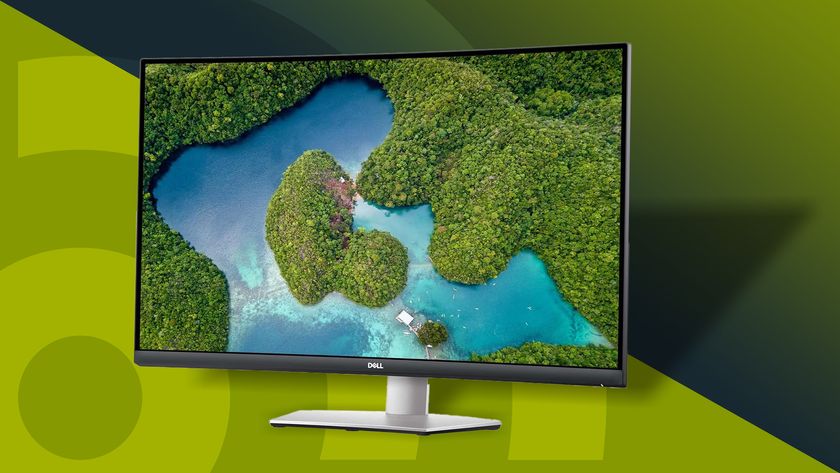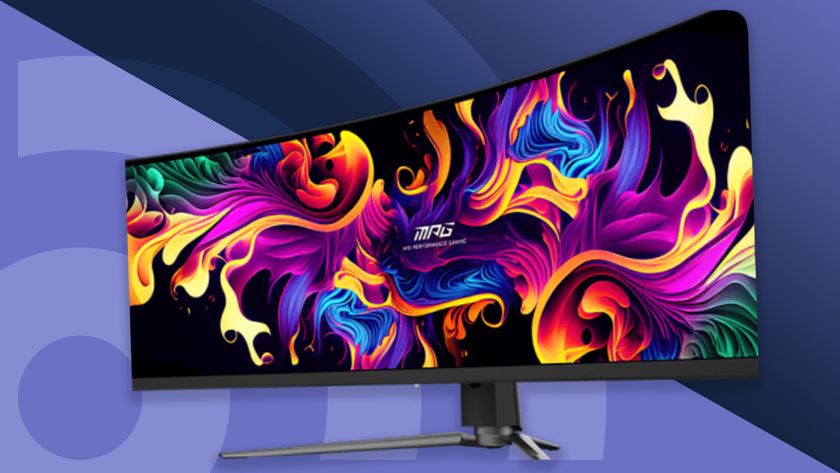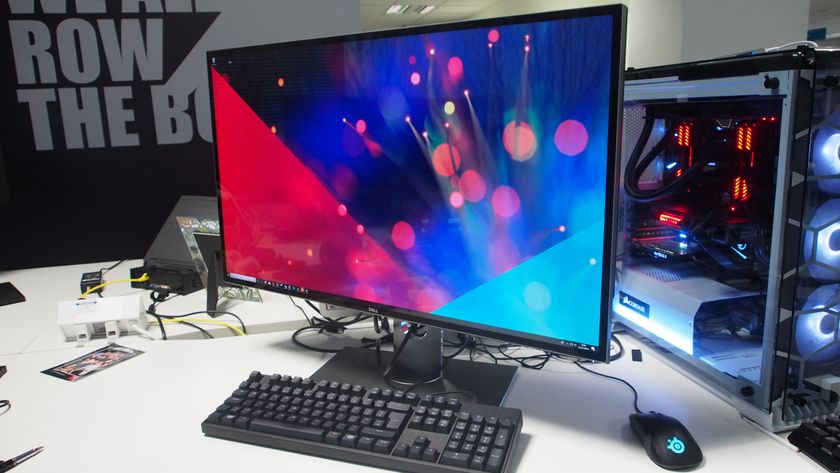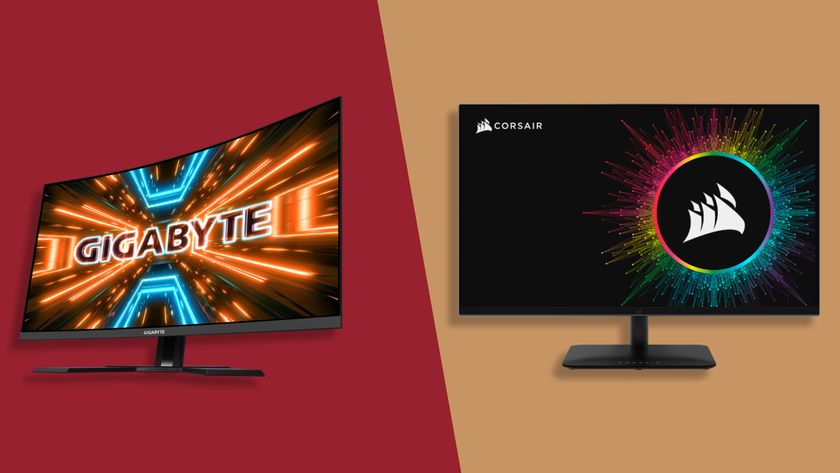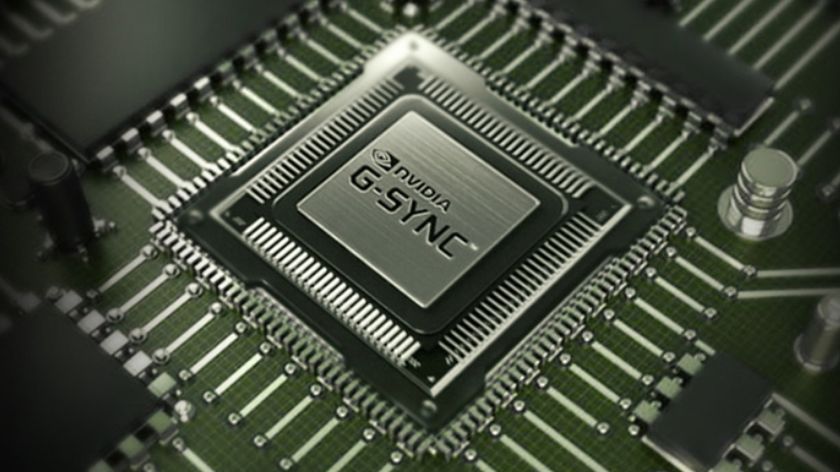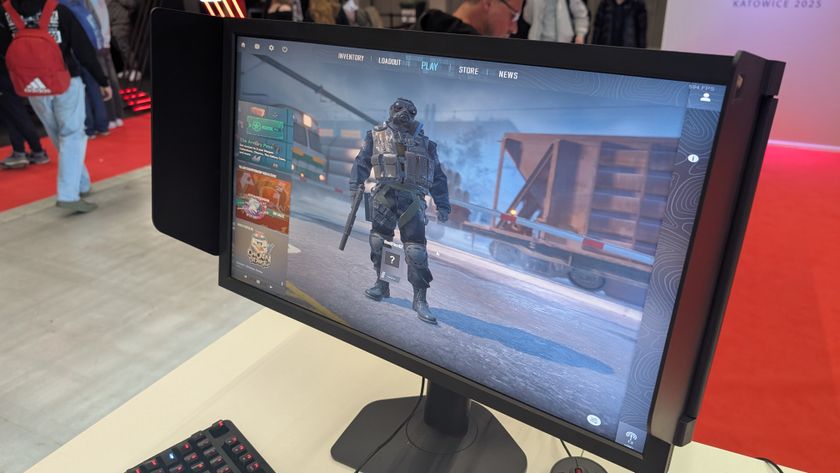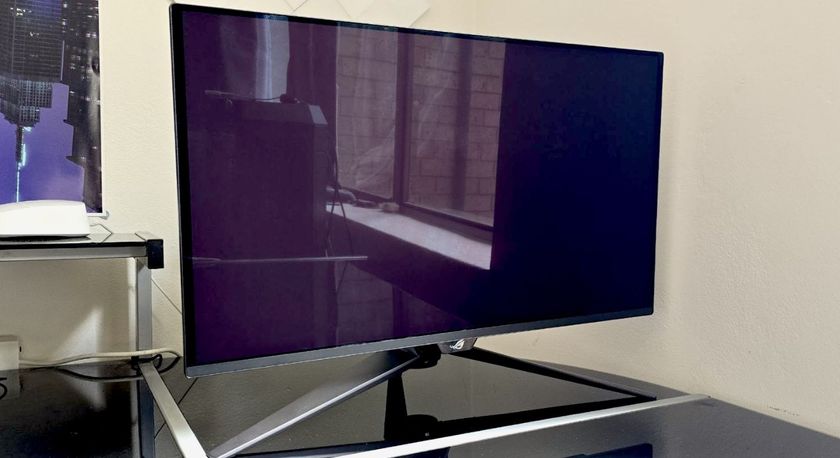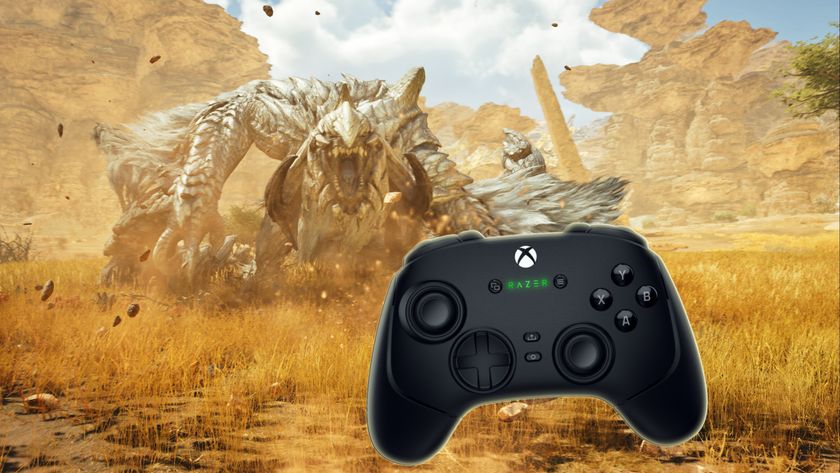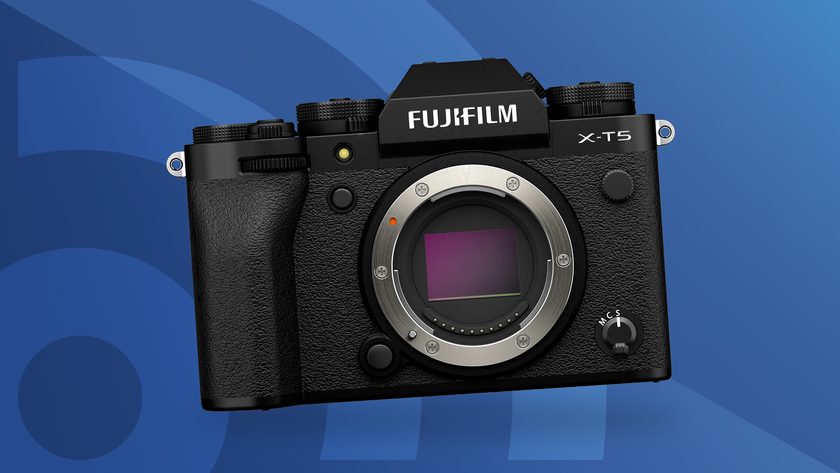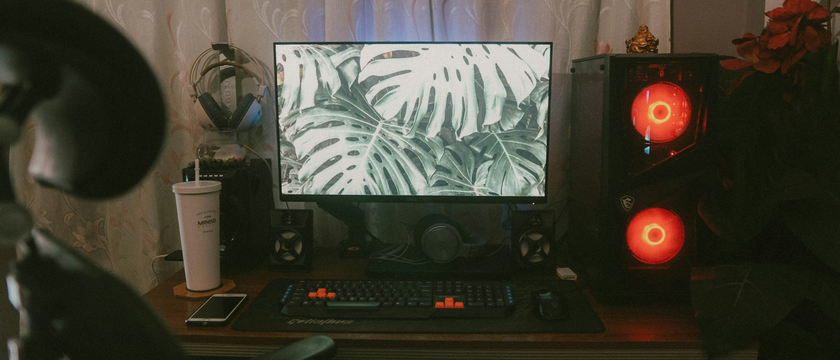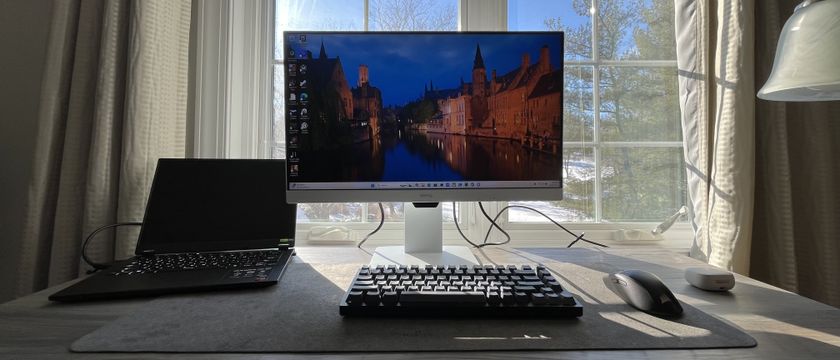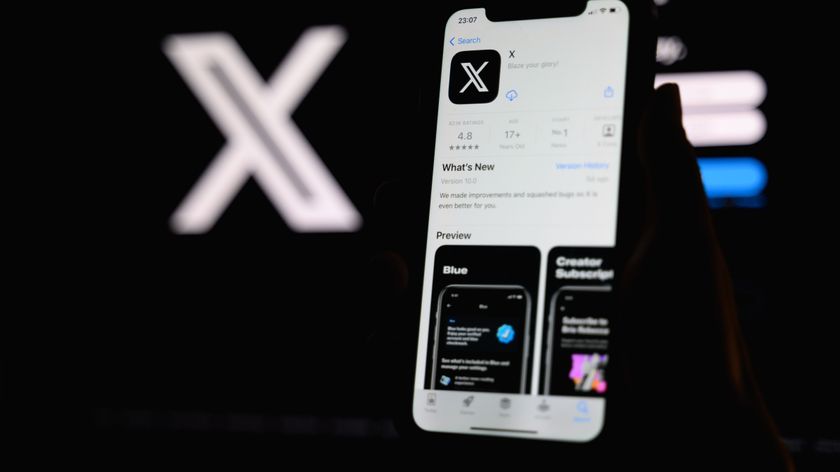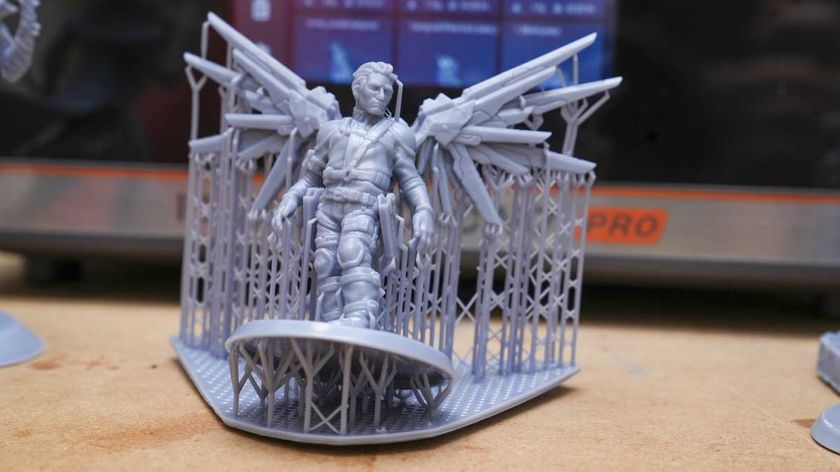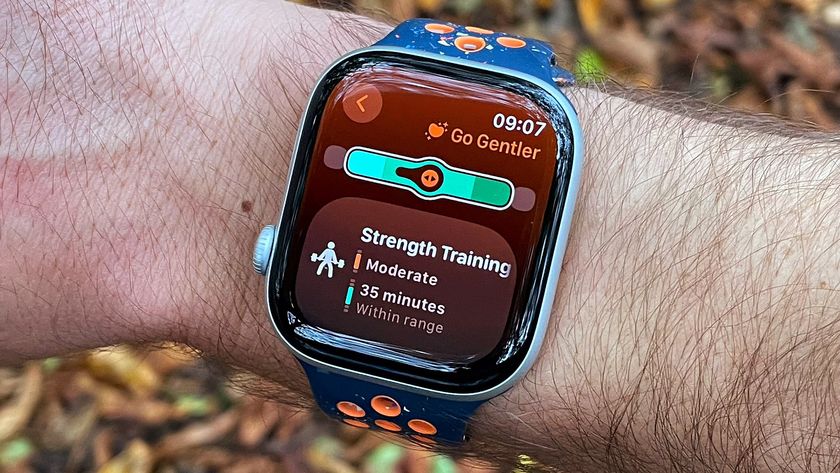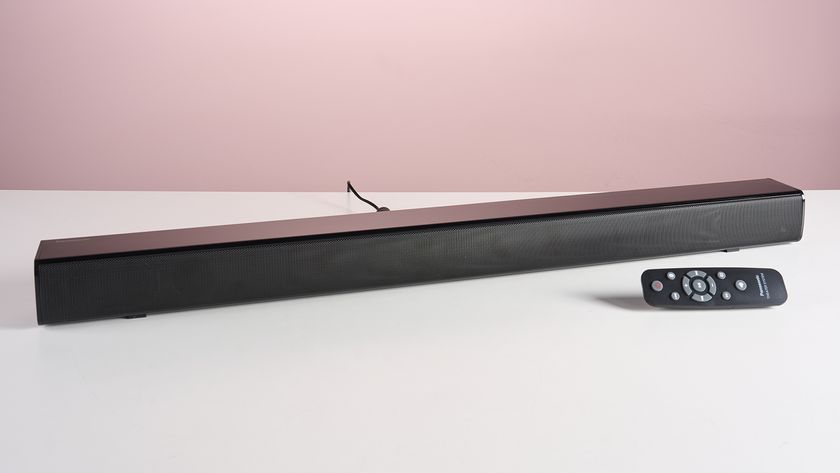The best monitor in 2025: top displays for every budget and resolution
What's the best monitor you can buy in 2025?
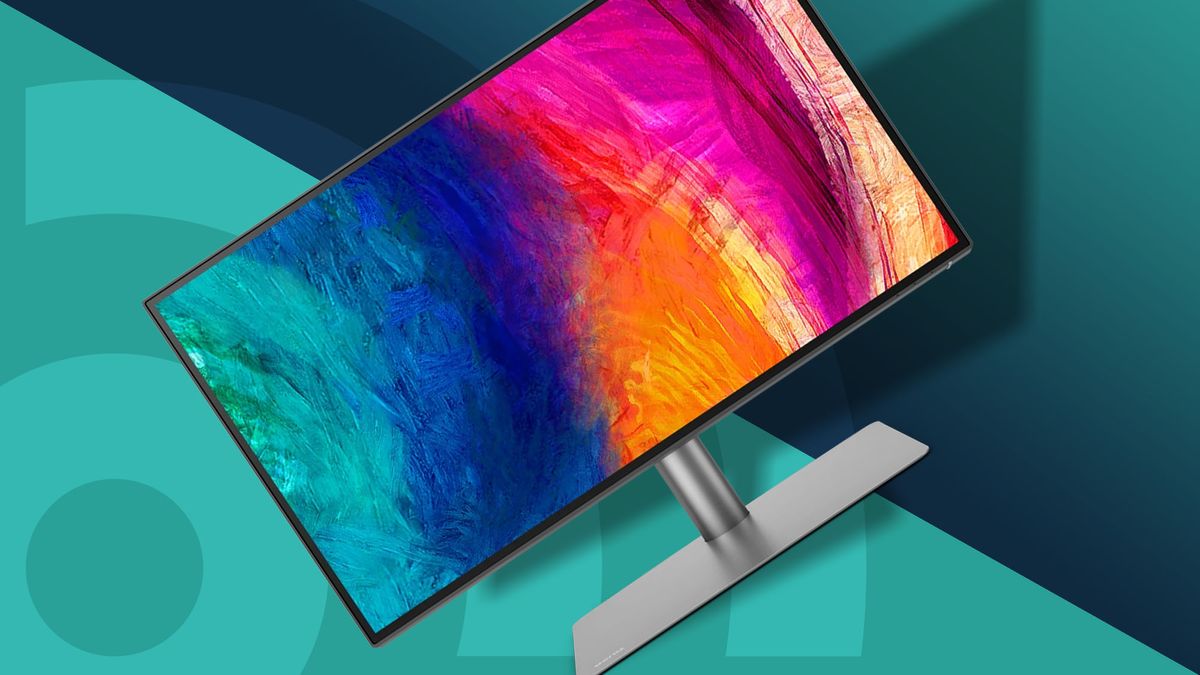
Getting one of the best monitors can be the difference between relishing the content in front of you and struggling through the day at your desk, so it’s important to make sure you get one that works for you.
Monitors come in all shapes and sizes, and picking one comes down to many factors. You need to know what you’ll use it for, whether that’s simply checking your emails or doing some advanced gaming or photo editing. Your budget is important, as is the amount of desk space you have in front of you. And then there are all the extras that can help take your experience to the next level.
That might sound daunting, but our guide is here to help. We’ve spent years reviewing hundreds of monitors, so we’ve got a good idea of which displays are worth your time and which really aren’t.
For instance, our top pick is the BenQ PD2725U, and it’s one of the best 4K monitors you can get, offering a beautiful 27-inch screen and impressive color accuracy. It comes with plenty of connectivity options, so you should have no trouble hooking up peripherals, while its sleek design enables it to sit pretty in your workspace.
We also love the Arzopa M1RC, an affordable display that shows you don’t need to break the bank to get one of the best gaming monitors. It combines a 1440p resolution with a refresh rate up to 180Hz, ensuring your games look and play their best.
Whatever your needs, you’ll find a monitor that meets them in the guide below. Take a look to see which screen is right for you.
The quick list
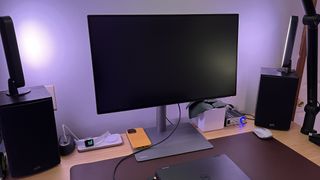
The best monitor overall
This display has it all: a 4K resolution, sleek design, multiple port options...the list goes on. And when it comes to image quality, you won't find a better option than the PD2725U at this price point.
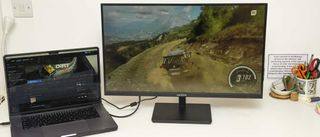
The best budget monitor
When you want a fantastic monitor, but you don't want to have to take out a loan to get one, turn to the 180Hz refresh rate and crisp 2K resolution the Arzopa M1RC offers.
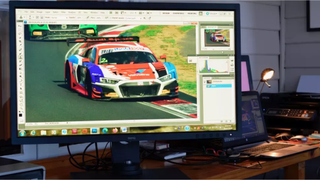
The best monitor for creative professionals
If you rely on your monitor for work or creative hobbies, be it photo and video editing, animation and graphic design, or CAD, the BenQ SW321C PhotoVue is a standout choice. It boasts an impressive color gamut of 99% of the Adobe RGB color space and 95% of DCI-P3.
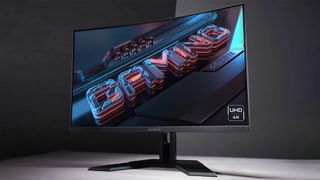
The best gaming monitor
When it comes to your gaming setup, few parts are quite as important as a quality monitor. The M32UC offers everything you need for gorgeous in-game worlds and competitive advantages, from a 160Hz max refresh rate and 1ms response time to its wonderful 4K display.
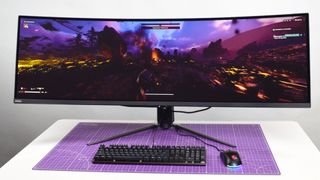
The best ultrawide monitor
For loads of OLED screen real estate without compromising on stunning visual quality or affordability, turn to the MSI MPG 491CQP QD-OLED.
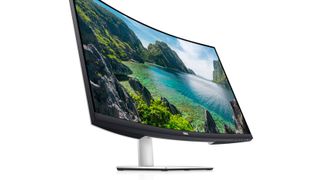
The best curved 4K monitor
Flat monitors are nice and all, but once you get addicted to that curve, it's hard to go back. And why would you want to, when this 4K Dell S3221QS looks so good? Its design is nice and clean, too - plus the added features, like built-in speakers, boost this display up even further.
Load the next 4 products...
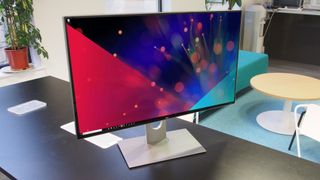
The best 8K monitor
If you have a rig capable of handling 8K resolutions, you need a top-of-the-line monitor to match its energy. This UltraSharp UP3218K is more than up to the task.
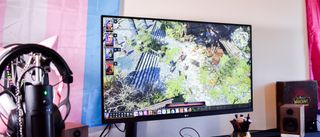
The best ergonomic monitor
Staring at screens for long periods at time every day can cause stress in your neck, back, and shoulders. Especially when your monitor sits on a static stand - the LG 32UN880, on the other hand, is able to pivot, tilt, and swivel into any angle you want.
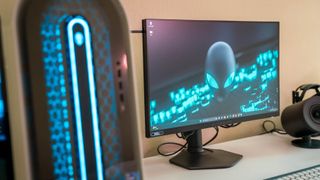
The best 500Hz gaming monitor
You play fast-paced, competitive titles where every split-second decision may be the deciding factory between victory and defeat. For a monitor that can keep up, look to Alienware's AW2524HF.
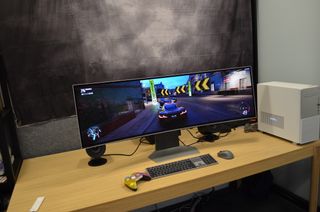
The best premium gaming monitor
Samsung's Odyssey OLED G9 isn't for everyone. But if you value peak performance, have a souped up PC, and want to match it with easily one of the best gaming monitors on the market, the Odyssey OLED G9 is for you.
Below you'll find full write-ups for each of the best monitor picks on our list. We've tested each one extensively, so you can be sure that our recommendations can be trusted.
The best monitor overall
Why you can trust TechRadar
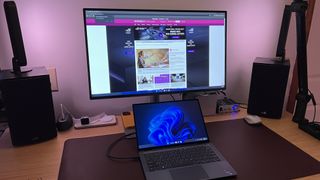
Specifications
Reasons to buy
Reasons to avoid
The BenQ PD2725U may be targeted towards creative professionals, but the great thing about this Mac-friendly, Thunderbolt 3-armed 4K display is that it’s actually pretty affordable for what it offers. We found during our testing that it doesn’t just offer a range of connectivity options, boasts a sleek, modern design, and comes abundant with multitasking features like Picture-by-Picture and Picture-in-Picture modes.
Being a creator’s tool, it delivers excellent color accuracy – as well as crisp images and 95% Display P3 color coverage. So, though its built-in speakers didn’t show a lot of promise, it’s still a fantastic display for creators. However, it’s the price tag that makes it ideal for everyone else. Sure, there are much cheaper 4K options on the market, but if you want top-notch image quality, this one is actually pretty attainable for non-pro users as well.
Read our full BenQ PD2725U review
The best budget monitor

Specifications
Reasons to buy
Reasons to avoid
Arzopa’s M1RC 27-inch 180Hz monitor is a prime example that a solid QHD IPS panel doesn’t have to drain your wallet to ensure the digital world’s you’re immersed in look stellar. It may not be a 4K display, but the sleek monitor caters to gamers and workers alike in myriad ways, specifically its beautiful visual fidelity and high refresh rate possible through USB Type-C and DisplayPort inputs. Even via the HDMI 2.0 port, it can achieve a smooth 144Hz.
Arzopa put its focus into building a quality display, but may have overlooked a few design choices. The included stand has a very limited range, but being VESA-compatible, that’s very fixable with a monitor arm, wall mount, or replacement stand. In fact, with the right monitor arm and a few of these 27-inch panels, you can have a suitable two- or three-monitor setup without overspending.
Read our full Arzopa M1RC review
The best monitor for creative professionals

Specifications
Reasons to buy
Reasons to avoid
Pro-level displays are no longer the premium priced, inaccessible purchase they started out to be. At least as far as the BenQ SW321C PhotoVue is concerned. This 32-inch 4K photo monitor is up a step or two in terms of both performance and usability, featuring an incredibly wide color gamut of 99% of the Adobe RGB color space and 95% of DCI-P3.
If you’re in the cinematography or photography sphere, that’s exactly what you need. To test this monitor’s performance, we ran software-based calibration using the SpyderX Elite colorimeter. And, its scores for color gamut, tone response, white point uniformity, contrast, luminance uniformity, color uniformity and color accuracy were excellent.
This monitor might be a little bit older than most, but it's still got serious performance chops for professional users, and the fact that it's just slightly out of date means you're likely to find it for a bargain at a lot of retailers. And, that’s on top of all the other features this monitor boasts.
Read our full BenQ SW321C PhotoVue review
The best gaming monitor

Specifications
Reasons to buy
Reasons to avoid
Multiplatform gamers looking for a high-performance 32-inch gaming monitor for 4K at 144Hz gaming will find a lot to appreciate about the M32UC from Gigabyte. With a respectable amount of ports and other useful features, along with snappy pixel response time and great color gamut coverage, this is a great looking monitor with satisfying performance.
The only thing about it is that out of the box, we found it presenting a fairly flat and dimly lit display image even when HDR is enabled. Calibration is certainly necessary. We had to fiddle with its brightness, contrast settings, color controls and HDR settings a little bit, but when we did, the visual experience it offered was incredible.
The HDR400 support is alright, but nothing special, but when you factor in the excellent price for this kind of curved display, you get one of the best 4K monitors for gaming by value on the market. Just don't expect much from the built-in speakers here, they barely get the job done.
Read our full Gigabyte M32UC review
The best ultrawide monitor

Specifications
Reasons to buy
Reasons to avoid
The MSI MPG 491CQP QD-OLED is a 49-inch curved ultrawide gaming monitor that should absolutely be on your radar if you're looking to go big with your display. It strikes an impressive balance of screen real estate, eye-catching visual fidelity, and surprising affordability with just a few notable downsides.
We loved how the colors popped on the OLED panel and enjoyed the smooth 144Hz refresh rate paired with the 0.03ms response time - these specs are the sweet spot for gaming. There are are a few issues, though.
Namely, the MPG 491CQP QD-OLED's double-edged sword right there at the end of its title: the OLED display.
On one hand, it's vibrant and eye-catching with fantastic HDR capabilities. On the other hand, if you want it to stay that way and avoid burn-in, you have to deal with the OLED care routine popping up every six hours or so. This prompts you to extend the life of your monitor by powering down for between five to 30 minutes. An annoying interruption or a subtle reminder to get up and stretch your legs - you be the judge.
However, that's the one major downside to a sea of positives here, like a handy port selection, 1000-nit peak brightness, sleek design, and a price tag that doesn't cost a second gaming PC.
Read our full MSI MPG 491CQP QD-OLED review
The best curved 4K monitor
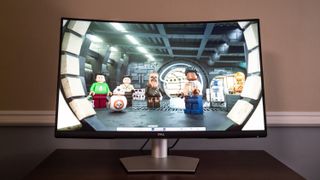
Specifications
Reasons to buy
Reasons to avoid
The Dell S3221QS is a gorgeous monitor inside and out. Its simple yet elegant silver design gives it a unique look that sets it apart from all the gamer-centric or boring black office monitors you're most likely to find. It comes with a stunning 4K VA panel to match, which looks great and delivers colors that we found to be accurate and rich as well as crisp and detailed image quality. Because of the 1800R curvature, even after hours of use, there’s no eye strain.
And, to make it an even better proposition, it’s got some great features as well – namely, decent-sounding speakers and an interesting picture-in-picture functionality that will let you display two different computers in the same display. That’s pretty nifty and a great way to make up for the fact that there’s no USB-C connectivity. This model is a couple of years old at this point, but the past couple of years have been fairly slow for monitor developments, especially on the more mainstream and business-user side of things, so it can hold its own against the best business monitors out there.
Read our full Dell 4K S3221QS Curved Monitor review
The best 8K monitor
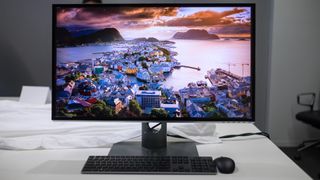
Specifications
Reasons to buy
Reasons to avoid
We don’t usually run into technology that’s so far ahead of the curve that we’re left dumbfounded, which is why the Dell UltraSharp UP3218K has impressed us even more. Finding one of the best monitors that can reach the raw gorgeousness this one can should be next to impossible. It’s not just the resolution, either.
Dell went so far as to ensure that the build quality and color reproduction are the best in the business as well. The monitor is factory calibrated, so it looks great without any tinkering, and that ultra-high resolution, along with the color handling of the monitor, makes any content look incredible – so incredible that sometimes, a footage almost looks 3D with the amount of detail you’re getting.
The Dell UltraSharp UP3218K is aimed at professionals, obviously, so if that sounds like it’s made for you, it’s probably the best monitor you’ll ever find. This product is only available in the US and UK right now, and given that it's a couple of years old at this point, it's harder to find than most.
Read our full Dell UltraSharp UP3218K review
The best ergonomic monitor
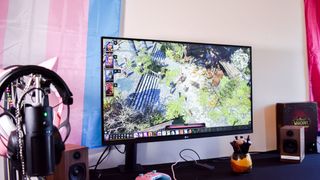
Specifications
Reasons to buy
Reasons to avoid
The LG 32UN880 UltraFine Display Ergo has done something cool. Instead of going for the same homogeneous mount and stand that all monitors have, it has opted for a C-Clamp, One Click Mount that allows it to extend, retract, go high, go low, tilt and pivot like no other. That’s versatility turned up to 11.
It also boasts incredible color accuracy and beautiful picture quality. The best part is that you’re getting all that without burning a massive hole in your pocket. This is, without a doubt, among the best monitors out there, especially if you're looking for an arm-supported display rather than one on a static stand you typically find on the shelves.
There are a number of arm-supported models coming out in the next few months though, so this monitor might lose the title of "best" in this particular class, but it is also a lot cheaper as a result, so you can't really go wrong.
Read our full LG 32UN880 UltraFine Display Ergo review
The best 500Hz gaming monitor
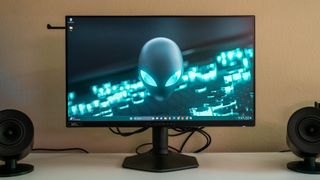
Specifications
Reasons to buy
Reasons to avoid
In the realm of gaming monitors, the debate over the necessity of a 500Hz refresh rate persists, though most gamers currently find 144Hz sufficient for their fast-paced adventures. Alienware's latest addition, the Alienware AW2524HF, is making waves with its 500Hz (overclocked) / 480Hz (native) refresh rate, a rarity in the market. What sets it apart from its predecessor is its $180 lower price point in the US, making it an attractive option for early adopters and a smart, future-proof investment for gamers, particularly those in the competitive scene, without significant compromises on quality.
In a world where gaming standards continue to evolve, the Alienware AW2524HF offers a compelling proposition for those seeking top-tier performance without breaking the bank, making it a noteworthy addition to the gaming monitor landscape.
Read our full Alienware AW2524H review
The best premium gaming monitor
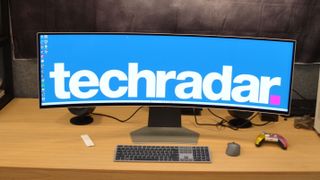
Specifications
Reasons to buy
Reasons to avoid
The Samsung Odyssey G9 has consistently been a premium gaming monitor, and this trend continues with its latest iteration. Now equipped with an OLED panel, this update significantly enhances its value by surpassing its predecessor in almost every aspect.
When combined with a suitable high-performance graphics card, games like Forza Horizon 5 and Doom: Eternal look truly stunning on this monitor, particularly with its expansive 32:9 ultrawide aspect ratio. The color accuracy remains exceptional, averaging a Delta-E of less than 1, achieving a measured sRGB gamut coverage of 143% in gaming modes and about 194% in other settings, with the DCI-P3 color space consistently near 137% across most gaming scenarios.
However, there's a significant design issue that detracts from the overall experience: the user interface is overly complex and cumbersome. Moreover, this monitor may not be a feasible choice for everyone, particularly those without a powerful PC setup. Yet, for those who require or desire the best premium gaming monitor on the market, the Samsung Odyssey G9 is unrivaled.
Read our full Samsung Odyssey OLED G9 review
The best monitor: FAQs
Which monitor brand is most reliable?
There are a lot of PC monitor brands out there making everything from cheap, portable office monitors to high-end gaming PC monitors with ultrawide aspect and 1000R curve rating, 1ms pixel response, and blazing fast refresh rates.
Among the best brands in this regard are Dell, Alienware, BenQ, Acer, LG, Samsung, HP, Lenovo, and Asus, but they are by no means the only ones.
Which monitor quality is best?
Well, this really depends on a couple of factors, but first and foremost is your use case.
If you're just a typical PC gamer looking for the best image quality, getting a 4K monitor with 144Hz refresh is going to make your games look fantastic. If you're an esports competitor (or want to be someday), then the only thing that matters is pixel response and refresh rate. Even a 1080p resolution is acceptable so long as it has at least 1ms pixel response or lower. The refresh on 1080p monitors can go as high as 360Hz or even higher with the very latest monitors coming onto the market.
For most people though, a 1440p monitor is often more than enough, since the jump from 1440p to 4K isn't nearly as impressive as the jump from 1080p to 1440p.
What is best screen size for 4K?
Depending on how far away from the screen you are, there will be a point where it just doesn't benefit you to upgrade to a new monitor with a higher resolution.
Typically, 32 inches is considered the best monitor size since this is the size where a person sitting about 3 feet away from a screen will be able to see the difference between 4K and 1440p. The difference isn't going to be huge, but it will be there.
How to choose the best monitor for you
To answer this, first, you need to ask what you need it to do.
Are you competing in esports? Then you need to go for the lowest pixel response rate you can afford (at least 1ms but even lower if possible), even if it means sacrificing image quality. All that matters is winning, after all, victory doesn't have to be pretty.
Are you a visual content creator, a photographer, or a graphic designer? Then you will definitely need a monitor that has the widest possible color coverage, usually given in percentage of various gamuts. sRGB is the gamut that covers the web, while DCI-P3 is the industry standard for films, and the Adobe gamut covers illustrators and photographers for the most part. Regardless of your use case, you need to get as close to 100% of your particular gamut as possible.
If you're on a high-end gaming desktop with the best graphics card on the market, then a 4K monitor or even an 8K display might be more of what you're looking for. 4K monitors are only just now starting to get higher refresh rates like 120Hz and 144Hz, so these are definitely the 4K panels that you need to keep an eye out for.
How we test monitors
We review monitors based on a number of factors including price, design, and performance. We consider the size of each display, as well as the number and type of ports on each monitor to determine who each display would benefit most. Each monitor is used in a variety of scenarios, so we use it for work, media consumption and gaming to test what it’s best suited to.
Performance is also evaluated by how well the actual screen tech works and its refresh rate. Frames per second are especially important in gaming monitors because you’ll want a high refresh rate during competitive games so you don’t miss a minute of the action.
Today's best monitor deals
Get daily insight, inspiration and deals in your inbox
Sign up for breaking news, reviews, opinion, top tech deals, and more.

John (He/Him) is the Components Editor here at TechRadar and he is also a programmer, gamer, activist, and Brooklyn College alum currently living in Brooklyn, NY.
Named by the CTA as a CES 2020 Media Trailblazer for his science and technology reporting, John specializes in all areas of computer science, including industry news, hardware reviews, PC gaming, as well as general science writing and the social impact of the tech industry.
You can find him online on Bluesky @johnloeffler.bsky.social
- Marcus Mears IIIComputing Reviews and Buying Guides Editor
- Christian GuytonEditor, Computing
